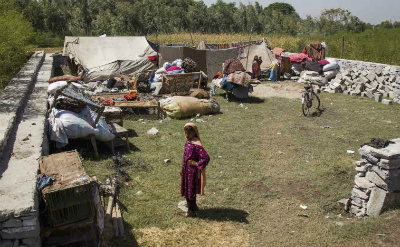By Ali M Latifi
Afghan refugees pressured by Pakistan to return to their volatile homeland where they face hunger and homelessness should be “patient”, according to an official who said his government plans to eventually offer more support.
The UN says more than 600,000 Afghans returned last year from Pakistan, where rights groups documented a campaign of harassment by the authorities. Pakistan suspended its repatriation plan in December, but resumed it on 3 April and returnees and advocates say the harassment has begun again.
A similar influx of returnees this year would further strain the capacity of the Afghan government, which is already unable to deal with those who came back in 2016. In addition, the UN says a record 400,000 people were displaced by war inside Afghanistan last year.
A recent UN survey found that 46 percent of returnees around the capital, Kabul, were severely food insecure. The figure was 30 percent in Nangarhar, a province bordering Pakistan. Of those surveyed in both locations, 63 percent listed employment as a “priority need”.
Another primary concern is that many returnees have no home to return to. Land would not only give them somewhere to build a house; it would also allow them to farm, which would cut down on hunger and unemployment.
Hafiz Ahmad Miakhel, a spokesman for the Ministry of Refugees and Repatriation, said the government is working on a land distribution programme. But he said it was a slow process due to factors including the need for various ministries to coordinate, and the time it takes to register all returnees and determine whether it’s safe for them to return to their homes districts.
“People have to be patient,” he told IRIN.
Little support
Patience is in short supply among those who are struggling to survive with little help.
“The government of Afghanistan keeps saying for people to come, but does nothing to support them,” said Amanullah, 19, who was deported from Pakistan in November and has been selling soup on the street since then in the town of Daronta, in Nangarhar.

A girl stands with her family's possessions which they've brought to Afghanistan's Nangarhar province after leaving Pakistan in August 2016. (Photo: Jim Huylebroek/NRC)
The government gives each returnee $50, while the UN refugee agency, UNHCR, provides registered refugees with another $200.
That money disappears quickly, returnees said. Most have to rent houses at a cost of $75 to $100 a month.
“I wish we could say we spent it on a luxury, but it all went to rent and to feed our families,” said Akbar Khan, who has been unable to return to his home in Paktika Province because the security situation is so poor.
Humanitarian groups like the Norwegian Refugee Council [NRC] provide support to some returnees, including building shelters, but most receive little help. The $200 cash grant provided by UNHCR is half of what it was last year.
The government and humanitarian agencies asked for $550 million to fund programmes in 2017, of which only 21 percent has been committed or delivered so far.
“As aid agencies there is only so much we can do with the budgets and resources we’re given,” said Mohammad Nader Farhad, a spokesman for UNHCR. “There are some institutional matters that different ministries of the Afghan government will have to work on as well.”
The inability of ministries to coordinate and provide long-term solutions, such as land distribution, has bedeviled the government for years.
A year ago, Amnesty International reported that the government had failed to implement a national policy to provide basic living conditions for displaced people. Amnesty found many were living “on the brink of survival”.
That situation is worse now, since 2016 saw record numbers of both returning refugees and people displaced by fighting. And it could get even more desperate as Pakistan ramps up its repatriation efforts, even as the war in Afghanistan intensifies.
Harassment again
There are still more than two million Afghan refugees in Pakistan, about half of whom Pakistan has refused to register officially. Will Carter of the NRC has been interviewing people crossing into Afghanistan.
“Unregistered returnees that I spoke with at the border crossing over the past few days expressed that the main reason they returned was because of increases in harassment and detention of family members,” he told IRIN.
Although Pakistani officials have repeatedly denied that authorities were purposefully harassing Afghan refugees, such reports became common during the second half of last year, when most Afghans returned.
Returnees told IRIN that Pakistani police repeatedly arrested family members, and offered 10,000 rupees [$95] to people to report the whereabouts of Afghans.
Afsad, who spent his entire life in Pakistan, said his family finally decided to leave after neighbours whom they’d lived beside for decades reported them.
“They would say, ‘Leave your livestock, your vehicles, your motorcycles.’ Even on our way out, people were taking advantage of us,” said Afsad.
Like many returnees, Afsad and his family had a relatively comfortable life in Pakistan. Now they are forced to start again in a country where the economy has collapsed, a record number of civilians died last year, and the government seems unable to support even their basic needs.



